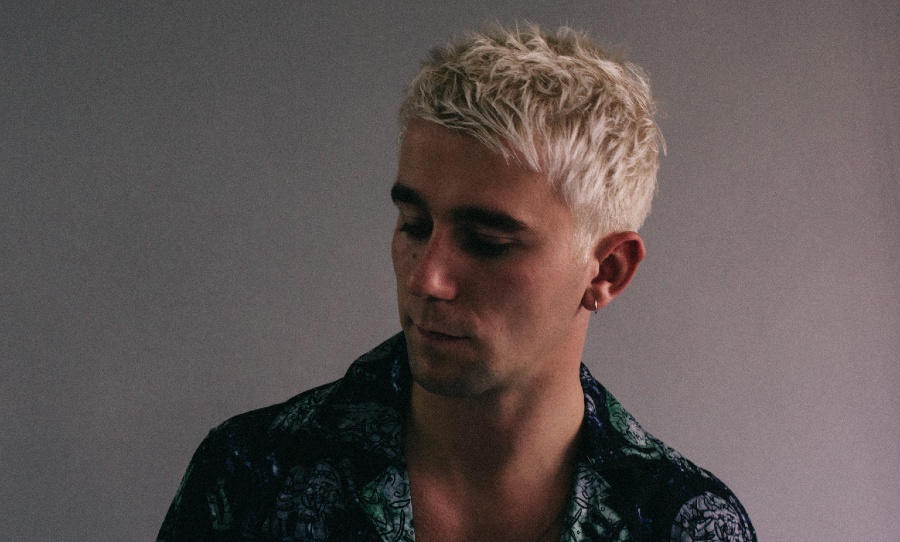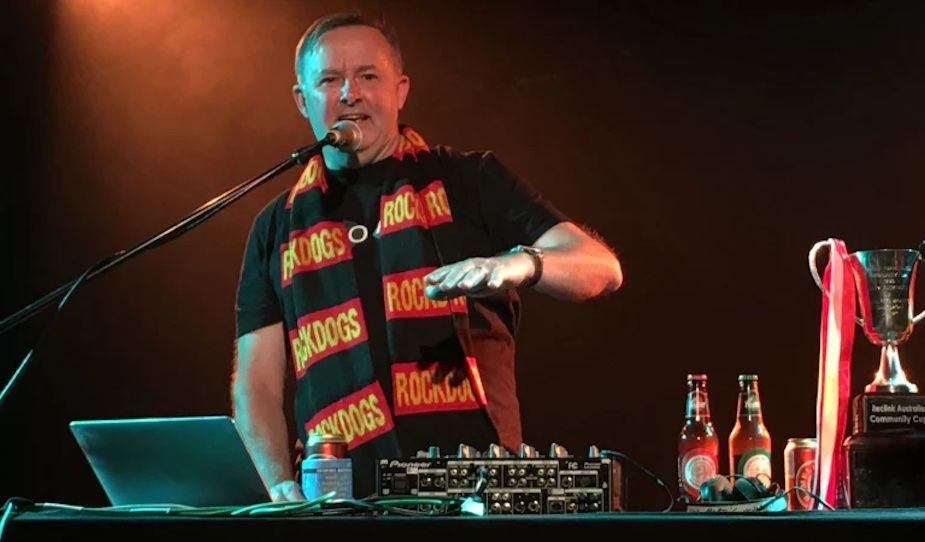With the evocative sounds of disco, house, and soul in his back pocket, SG Lewis distills the central experience of club music into 10 tracks on times.
SG Lewis is getting closer and closer to the feeling he’s been chasing since day dot: that sense of total euphoria that’s intensely familiar to anyone who’s ever lost themselves on a dance floor. His early work referenced the escapist nature of dance music in more obvious terms, literally naming records for fleeting moments in a night out (Dusk, Dark, Dawn), but on his debut album, SG Lewis completes the circle.
times is both referential to the greatest hits of dance music’s history, and reverent of how people managed to come together during these moments. Disco’s influence is felt side-by-side with classic house or soul, and rightly so, a few of the scene’s biggest stars strut their stuff throughout the track list. Nile Rodgers appears on One More, Robyn lends her voice to Impact, and an interview SG Lewis had with legendary sound engineer Alex Rosner bleeds into the album twice.
Off the back of a time we’ve all been further apart than ever, SG Lewis has written album all about coming together. Ironically, our interview took place over the internet, but a shared love of disco can transcend any digital border.

HAPPY: So, I’ve listened to the new record and I really love it!
SG LEWIS: Thank you!
HAPPY: There’s this theory I have that every producer, and especially DJ, secretly wants to make a disco record. Has this always been a direction that you’ve thought about?
SG LEWIS: I think disco is a pretty broadly loved genre. I think that if you’re into dance music and disco doesn’t move you in some way, shape, or form… it’s hard to imagine that. I’ve always collected disco records on a hobbyist level. As much as music has always been my job, it’s always been something that I’ve done outside of even my work, it’s just collecting disco because I love digging for those records and finding old, obscure disco types that have been forgotten about or re-edited. So I think this album is very much a merging of worlds for me. It’s actually just exploring a genre I love purely as a fan as much as someone that makes music. I think that music has a slightly cyclical nature, things kind of come back around. At the start, disco was providing the kind of escapism that everyone was longing for last year with the lockdowns and stuff. I’ve definitely wanted to do one for a while. I think even having this album being influenced by it so much has been cool.
HAPPY: Definitely. You’re right about the timing. Do you DJ disco records?
SG LEWIS: Yeah! I’ve got basically 12s and 10s in my flat and I’ve got a lot of friends that DJ as hobbyists rather than professionally. Honestly, most of what we do on the weekend is comparing records and playing records in the flat. Not right now because it’s lockdown, but it’s kind of what we do for fun. So, yeah, we love collecting and playing records.
HAPPY: While we’re on that I’ve got to ask – it was on your record that I’ve became acquainted with Alex Rosner. I hadn’t heard of him before. Who is this character? There’s very little out there about him but he just seems like this crazy, behind-the-scenes figure.
SG LEWIS: So basically, this whole journey of this album began with me reading this book by Tim Lawrence called Love Saves the Day. I’ve always collected disco. I liked playing it, but it was one of my friends, I’d trade records with him and stuff, who was like ‘you should read this book and learn about the roots of it and where it came from’. So, this book kind of details ’70s New York disco, The Loft, David Mancuso, Paradise Garage, all this stuff. One of the names mentioned quite early on is Alex Rosner. Basically, he’s this legendary sound engineer who designed the first stereo DJ mixer. So, sort of the godfather of DJs in some sense. On the other hand, he designed a lot of the sound systems for the first disco clubs like The Loft and stuff.
Basically everyone that I read about in the book, I would stop reading and I would go and research. I would do some diving on the internet and stuff. I was basically watching these interviews he gave. He gave a Red Bull Music Academy interview, and his voice has this incredible New York accent, but it was so European. As soon as I heard him talk, I just wanted to hear him talk about anything. I sampled a snippet of him talking about what it was like to be in those clubs in the ’70s and I went to clear the sample, and then went down this rabbit hole of emails and ended up in direct contact with the man himself. He’s quite old now, so he’s really articulate and with it. I said I want to clear a song and he said “great, but I have no idea where the audio is from or who owns it”.
He said, “I can’t clear it but if you want to do your own interview, I’d be happy to jump on the phone and you can just take your samples from that”. I basically spent an hour and a half with him on FaceTime asking him loads of questions about what it was like, what the music was like, and asking him about music now, and it was incredible! The interlude and the snippet that you hear at the start of the album are both from the conversation that we had.
HAPPY: That’s super interesting. I saw the Red Bull Music Academy interview and I jammed the quote from the Rosner’s Interlude into Google but I couldn’t find it, so that’s sick.
SG LEWIS: Yeah, it was cool!
HAPPY: You sort of touched on it before, but aside from the technical connections between contemporary dance music and disco, I think there’s a big spiritual one as well. It’s all about getting together, escapism, and dance floor euphoria. Was this an important part of your upbringing?
SG LEWIS: That is almost much more the focus. When I say to people that this music, this album, is disco influenced, it’s much less about the technicalities of disco as a genre and it’s much more about what it meant to people at the time. The music serves as a soundtrack for this escapism, especially for marginalised communities in ’70s New York. It’s a place where people could come together and celebrate their identity and life. Over the last kind of five years, I’ve been lucky enough to be in an environment where I’ve felt like music has been providing that safe space for people. I thought that was such an amazing thing for music and for club spaces to be able to do, to bring people together regardless of race, sexuality, where they’re from. Just really that central message of inclusivity was something that I really became an admirer of, and I wanted to channel some of that. I thought that if I could create music that could provide soundtracks to those moments, that would be pretty amazing.
HAPPY: Awesome. I think even as the music changed, the soul of that became house, or trance, or whatever else along the way.
SG LEWIS: Well across the album, disco’s footprint is everywhere, but a lot of it is also house music and a lot of it is a bit more ’80s style, like new wave and stuff, but they’re all kind of tied together by this footprint. I think you’re right, whether you’re looking at disco as like a funk band or soul vocals, or whether you’re looking at it as just the genre that paved the way for most contemporary dance styles. I don’t look at the album as a disco album as such, but it is definitely hugely influenced by disco and couldn’t exist without it.
HAPPY: How did those influences manifest in the samples that you chose on the record? I noticed a lot of super classic drum machines, for instance.
SG LEWIS: I think it was just listening to a lot of music from that period. For instance, you can heavily hear Jamiroquai’s influence on something like Feed the Fire, that’s ’90s. Jamiroquai aren’t necessarily from that era, 70’s New York, but their influence, you can hear it in their music. I think I just wanted to make nods to different eras that I was being influenced by, even if they were subtle nods in the production and stuff, things that have inspired me and influenced me. Those little tips of the hat in the production.
HAPPY: Yeah, definitely! Are there any references like that that are really deeply embedded? Almost just for you?
SG LEWIS: Yeah, I see people tweet them all the time and figure them out. There are definitely little moments, even down to snares somewhere. Even in something like Heartbreak on the Dancefloor which is basically referencing S.O.S. Band’s Just Be Good to Me, the kind of drum break at the start. Little things where I think people that know will be able to join the dots, but there’s definitely little references littered throughout the album.
HAPPY: The other thing I want to talk about is, of course, you’re singing throughout the record. Have you found there to be an emotional difference between getting a feeling out in chords, beats, and production, versus actually saying the words?
SG LEWIS: The singing thing has kind of kicked the door down for me creatively. There’s only so much I can express myself with when I’m focusing purely on instrumental, because then you’re laying the foundation down for someone else to tell a story. It’s just meant that in the studio if there’s something I want to say and convey, I now can. It’s empowered me to work more independently and be able to express my ideas in the studio and by myself. I’m always going to love collaborating with people. I’m such a collaborator and it’s such a thing that I enjoy, but at the same time, it’s now given me a lot of pleasure and excitement to be able to create music on my own terms and be able to express myself. For instance, the song Chemicals, I just aimed to write a story down from this one night in my life and this experience with this person and then relay the story in the song. All of a sudden when you look back at the song it’s like ‘oh cool, it’s basically like a diary’. That’s something very new for me so I’m enjoying that challenge at the moment.
HAPPY: Yeah like, ‘oh that’s why everyone does it!’
SG LEWIS: Exactly! It’s like therapy!
HAPPY: In terms of getting your voice to a place that you were happy with, where you just self-critiquing and improving, or did you actually go get singing lessons?
SG LEWIS: I’m definitely still improving. Compared to production I’m still in nursery with singing, it’s early days. I definitely just decided that I had to start singing every day. I got a couple of lessons to help me with breathing and technique and stuff. The biggest one was going on tour and forcing myself to go and sing these songs. There was definitely a run of shows where I was singing terribly. I like to drop myself into the deep end with these things. I think I just force myself to get better and put myself on stage and put a couple of new songs in the set before they’re out and be like ‘you’ve got to go sing these songs now’. It was like ‘wow, shit, I’ve got to perform these now!’ I think that sometimes that sink or swim approach can force you to work it out quicker.
HAPPY: Soon you’ll be singing on other people’s songs! Full circle.
SG LEWIS: Well, funny you should say that!
HAPPY: Oh yeah?
SG LEWIS: Soon, soon!
Times is out now via PMR / Caroline Australia. Stream or purchase the album here.
If you’re quick, you can also join SG Lewis for times: THE LIVE EXPERIENCE from 8pm AEDT on Friday 19 Feb. Tickets are available here.



